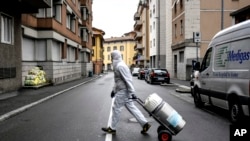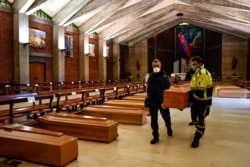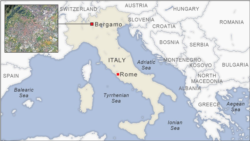The Italian city of Bergamo was hard-hit by coronavirus and became the country’s center for the disease. Now that there are signs infections are slowing there, observers are realizing what went wrong.
The head of the city of Bergamo’s doctors’ association, Guido Marinoni, says that back in January, pneumonia cases were not recognized as the novel coronavirus.
He says doctors in the northern Italian city did not have adequate protective gear and were not being tested despite showing light symptoms. Areas that should have been locked down, he added, were not, and that augmented the spread of the virus.
Marinoni says testing of doctors only started last week and many still don’t have necessary protective gear.
The doctor says the true number of dead and infected is much higher than reflected by official figures because they only account for patients who are tested or die in the hospitals, but not those who die at home or in elderly care facilities.
Marinoni said the population in elderly homes in Bergamo is approximately 6,000 and in one month alone 600 have died.
The doctor says as signs of a possible plateau in new infections emerge, it will be important to return to normal activity slowly, ensuring that people who were infected or isolated are tested carefully.
He said that if we let people return to work too soon, it will reignite the outbreak and the fire will return. This, he added, will cause devastating damage, not only for people but also for the whole economy, because it will continue and not end.
Marinoni’s forecast is that an emergency situation will continue for months in Italy and that eradicating coronavirus will be dependent on people’s behavior and testing efforts. The reality, he says, is that only when a vaccine is found, will we be certain the problem will be eliminated.






